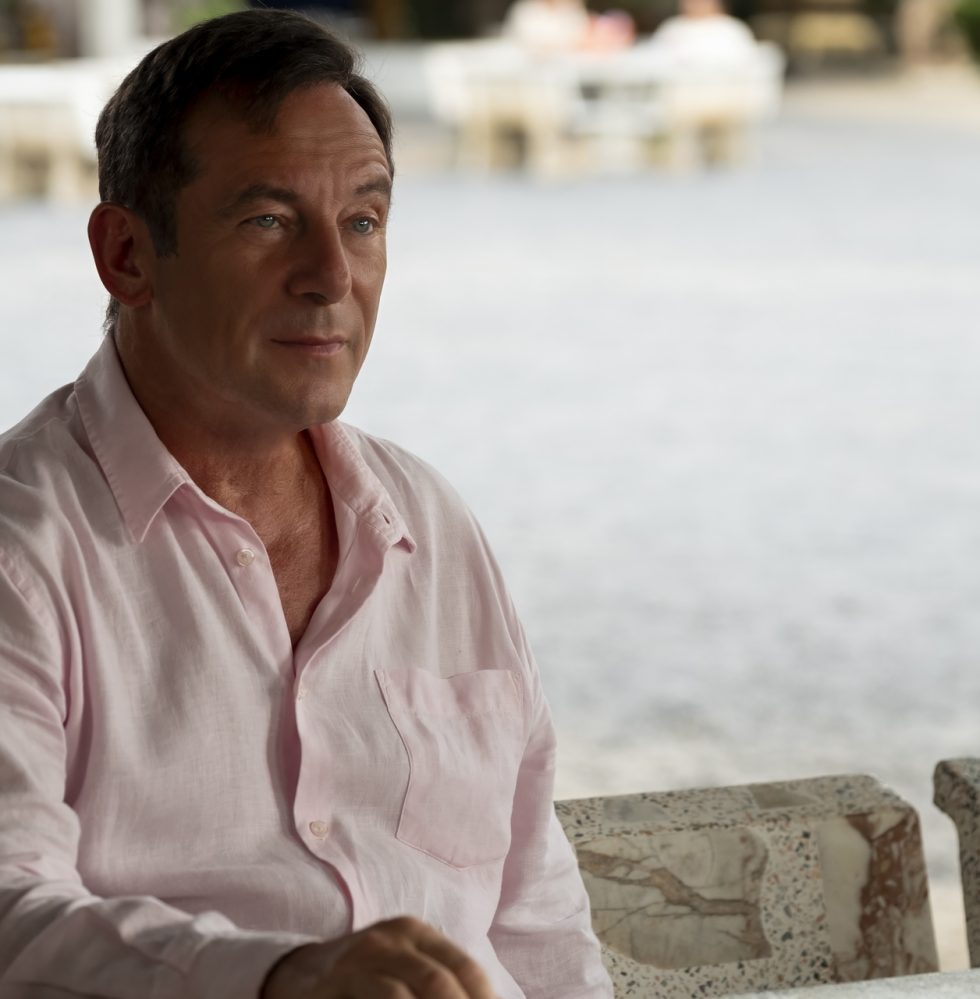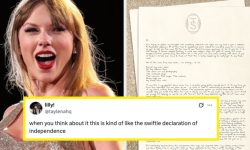
Jason Isaacs made his movie debut in 1989, in British romcom The Tall Guy, and has worked solidly ever since. He’s used to being recognized, mostly for his role as Lucius Malfoy in Harry Potter, but also for his small-screen work in Star Wars and Star Trek spin-offs. He expects that, given the fanatical audiences they attract, but he’s been blindsided by the amount of attention he’s had since the April finale of Mike White’s hit HBO show The White Lotus, in which he plays shady U.S. businessman Tim Ratliff.
“For the last few weeks, I’ve been recognized a lot, and in the most surprising places,” notes the deadpan 62-year-old Brit as he makes short work of a mushroom donburi at London’s White City House. “But that’s what usually happens: I’ll be recognized for a few weeks, and then it stops. I clearly have a kind of anonymous face, because I get the tube every day, I go to the supermarket, I walk down the street and maybe there’s occasionally a kind of double-take when I’m 50 yards past someone, and they’ll say, ‘Wasn’t that some bloke from a thing?’ But people forget very quickly.”
Tim Ratliff, though, will not go so quietly: The tycoon trapped in a loveless marriage, tormented by a past crime that’s coming back to bite him, and driven to consider the ultimate crime, famicide, using the seeds of the deadly pong-pong fruit. “Granted, it’s my duty to talk about the show,” he says. “But I’ve noticed that the more I’ve talked about it, the more I’ve thought about it, and the more I’ve appreciated the depth of Mike’s writing, and the opportunity he gave us to tell such complicated, nuanced stories.”

Isaacs with Parker Posey in ‘The White Lotus’
Fabio Lovino/HBO
He must be bored, though, of all the old questions; about the nudity, the on-set tensions and the spat with Duke University, whose college gear Ratliff wears to bed? Surely, he won’t want to touch them with a bargepole now? “I don’t mind touching them,” he shrugs. “The thing is, this brilliant story has captured so many people’s imaginations. And it’s not just their imaginations, it’s not just that they appreciated a story outside themself. They found themselves living vicariously through these extraordinary characters, or these ordinary characters in extraordinary situations, and they were stimulated and provoked to think about their own life choices, I hop if not consciously, then unconsciously. I thought Mike went much deeper even than the previous shows.”
“I’m so happy to be associated with something like that,” he continues, “because it has meant so much to so many people. Maybe because we all miss the community noticeboard. Maybe because we’re all living in our own silos, maybe because the world is becoming darker, and more fractured, and the show provided a little oasis for people for eight weeks. But one of the shames, possibly, is that in deconstructing it — and talking about how we made it, and who we are, and how we are with each other — it takes away from the power of what Mike did, and what those characters in those stories do.”
“People shouldn’t watch a screen and know whether someone’s straight or gay or Jewish or Catholic or what their political beliefs are. My favorite way to watch a movie or a TV show is to know nothing about what the story is going to be beforehand.”
Jason Isaacs
Isaacs freely admits that he was not the first choice for the role when he was first contacted. “I was in New York publicizing the Cary Grant miniseries Archie,” he recalls, “and so I was on a high, doing interviews all day. And then I got a call saying, ‘Mike White is interested in you for The White Lotus, but you’re going to have to put yourself on tape.’ And that’s an unusual experience for me, not because I think I’m better than that, but because people either offer me parts they think I can do, or they just ignore me, and I’m not on those lists. So, it was a novel experience.”
It had been a long time. And in order to get to the casting director’s office, he had to walk through Times Square, where his face was on gigantic billboards, constantly advertising him as Cary Grant. He laughs. “Not that I need humbling, ever — my wife and kids and dog do that — but should anyone else have been looking at me, they would’ve been reminded of where the actor really lives on the great totem pole of showbusiness.”
The audition was a disaster (“I was every bit as nervous and fumbly and stumbly and flushed and convinced I’ve blown it as I was when I first did 30 years ago,” he recalls). Nevertheless, he got the job, and his first act was to “make good” the lie he’d told them. “I’d said that it was my favorite show, that I thought it was a work of brilliance, and that Mike was a genius. Now, I do think Mike’s a magnificent writer and director, because I’ve followed him since I was at Sundance when he first emerged with Chuck & Buck. I’d watched everything he’d done film-wise ever since, but I hadn’t seen The White Lotus. So, of course, I watched it, and I became a huge fan after the fact.”
When he got the script, Isaacs immediately understood why several others had turned it down. Why? “Because Tim’s a guy who’s out of his head for five or six episodes on downers, not on entertaining uppers like Murray Bartlett was in Season 1. And with virtually no words to communicate this enormous story he’s got. I mean, the story of the three friends on holiday is completely relatable. But this is the story is of a billionaire losing all status in life. Many people go to Thailand in search of genuine spiritual enlightenment, but the last thing in the world he wants is to be stripped down to the bare essence of his soul, to review his entire life and see it fall apart in front of him.”

HBO
“His money and power and influence have always managed to solve his problems before, but those things are useless here. And he’s facing a personal apocalypse, having to look at his children and his wife and realize that they, too, are going to be cast into the abyss. To do all that, with no words, while taking pills that make you fall asleep, felt like a pretty big challenge. I was worried about two things: Was I good enough — and was it even possible?”
What was his strategy in the end? He laughs. “Oh, f*ck knows. I don’t know. I mean I’m an actor — I was scared of it, and then I thought I’d try and do it. There are different types of actors. There are some people who plan everything, and you find — with young actors particularly — that they’ve often given their most magnificent performance already, in their bathroom mirror, and that’s what they’re going to do in front of you. You could spontaneously combust, you could strangle a dog, and they wouldn’t blink. But, for me, I want to be in the moment. I cross out any words in the script that tell me what I’m thinking, whether I’m angry, or whether I’m sad. I just want to be able to feel it. It’s not the stuff that’s written down on the page. So, I had always to know everything that Tim was thinking. You need to have the life and the backstory in your head, always.”
And how did that work out with Parker Posey, who plays Victoria, his wife? “Well, we don’t really communicate,” he says, “at least not on camera. Tim and Victoria lost each other a long time ago, but when we arrive at the White Lotus he’s still loyal to her. But the whole family regard her as a bit of a joke, because she’s been lost to prescription drugs a long time ago. So we didn’t have to talk about what our backgrounds were, because our life experiences at that point are so different, and our thoughts about each other are so different, and our expectations are so different that we did our own thing, in many ways. And then I swap out with her: I’m out of it, and she’s becoming more and more hysterical as the pills that calm her down have disappeared.”
Victoria doesn’t have quite the same dramatic character arc as Tim, but she does get her own spectacular diva moment during a scene in which one of the other guests — wealthy Texan holidaymaker Kate, played by Leslie Bibb — accosts her at the breakfast table and reminds her that they’ve met before. Victoria’s froideur deserves a series of his own — but what was behind it?
“I was there that day,” says Isaacs. “You have to remember that these are people that travel by private plane. They don’t go to hotels, they’re slumming it at the White Lotus. There was a line that was cut from the scene where we arrive; the hotel manager says, ‘How was your journey?’ and I say, ‘Long layover in Doha. But, hey, we flew commercial. Save the planet!’ As if I wanted credit for not flying in our private plane! That’s the kind of people we are. So, Victoria wants to spend some away with her kids, who she doesn’t see very much, and she does not want to have to make small-talk with some random stranger. And she’s powerful, and snotty, and maybe blinkered enough — or just plain arrogant enough — to think, ‘No, I’m not talking to you. I don’t want to have be in conversation with you for a week.’ And that’s all it is.”
Nevertheless, such mysteries, deliberately left in the script by White, created outlandish speculative online gossip and meant that reporting on The White Lotus frequently blurred the line between fact and fiction. “By god, were there some crazy theories online, just like there were theories about the [real-life] relationships between the cast that are all wrong. But it just shows how much interest there was. That, I didn’t expect, but it was interesting to behold. What was fascinating, and slightly more worrying, was to see how proper websites, proper journalists — because they needed to have something about White Lotus every day — would just make stuff up. There was an interview I read somewhere with me that I never even gave, saying things I would never have said. Not even lies, just utter fiction.”
One online scuffle that he did enjoy was with Duke University, who claimed the show had brought their institution into disrepute by making Ratliff an alumni. “I did stir the pot slightly,” he laughs. “I was stuck at Charlotte airport. My bags didn’t arrive, so I had to buy a T-shirt and all that was there was a Duke outlet. I bought one that didn’t have the word Duke on it, just the symbol. But even that caused a lot of trouble. I thought it was entertainingly ridiculous that they made a fuss, because, clearly, the T-shirt I wore in the show would’ve been cleared. So it wasn’t like it was a breach of anything. And, besides, they have some extraordinary real-life alumni that they should be slightly more worried about than a fictitious character who, in the end, finds spiritual enlightenment.”

Read the digital edition of Deadline’s Emmy Preview magazine here.
Isaacs has been talking now for the best part of an hour, and though he speaks, self-deprecatingly, about “talking about myself endlessly”, he actually doesn’t do that. “I’ll talk about myself a bit and it feels flattering,” he admits. “But there’s a part of me that grew up admiring that famous generation of ’70s actors — like Pacino, De Niro, Hoffman, the great Gene Hackman — and I knew nothing about them. It really helped me suspend my disbelief. I’m asked about my accent a lot, because that also went viral too for a while, but the truth is, I don’t want people to think about where I’m from.”
“People shouldn’t watch a screen and know whether someone’s straight or gay or Jewish or Catholic or what their political beliefs are,” he says, as the conversation closes. “My favorite way to watch a movie or a TV show is to know nothing about what the story is going to be beforehand. To not read a preview. To be at a film festival when someone says, ‘I’ve got a spare ticket for something that starts in a minute…’ And you go in, and suddenly this big screen lights up, and you’re in someone else’s world for two hours. I wish people could just watch stories like that, and that we didn’t have to unpack everything for them.”



